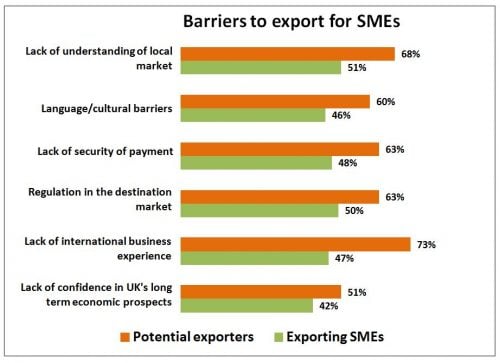International trade improves productivity and resilience – both at national and enterprise level. Sooner or later, small businesses find themselves contemplating the decision of whether to go global as a logical next step for expansion. But new research suggests too many of the UK’s SMEs see exporting as complicated and risky.
The research, from HSBC, of over 1,000 small and medium enterprises (SMEs) in the United Kingdom, finds they want to explore the benefits of international trade, but are wary of doing so, mainly because of perceived barriers.
 A new report suggests too many British SMEs see exporting as complicated with differences in perceived barriers between those already exporting and those still considering it. Image: pixabay
A new report suggests too many British SMEs see exporting as complicated with differences in perceived barriers between those already exporting and those still considering it. Image: pixabay
SMEs know that exporting or trading internationally can be good for business, but they are often held back from taking the first step through lack of confidence, lack of knowledge, or lack of support, says the report, which also notes:
“The impact of the UK’s decision to leave the EU adds another potential layer of complexity for business to navigate.”
Benefits not so clear to SMEs not yet exporting
The research attempts to explain why SMEs see exporting as complicated: while the benefits of exporting are clear, there are many barriers, and attitudes to international trade also appear to be changing.
As far as the benefits are concerned, they are obvious to many SMEs that are already trading globally. For 22 percent of SMEs already exporting, the research finds that international trade accounts for more than half their total revenue.
However, the benefits are not so clear to SMEs that have not yet taken the plunge into overseas markets. Of these, less than half (45 percent) believe exporting is important for growth.
Barriers to export
The research also examines perceptions of barriers to export. It reveals six perceived barriers to exporting, but the extent to which they are of concern differs slightly in already exporting SMEs compared to potential exporters (see bar chart below).

For example, as the bar chart shows, the potential exporters appear to be most concerned about lack of international business experience, while the exporting SMEs seem to be most concerned about lack of understanding of the local market.
Ways forward
The report gives four areas that HSBC believes government, business, and financial sectors should think about in order to encourage more SMEs to trade internationally:
– bring in targeted incentives such as tax credit for exporters
– give SMEs a voice in trade negotiations
– tailor support and make it more accessible, clear, and signposted
– share best practice and help potential exporters learn from others’ experience

